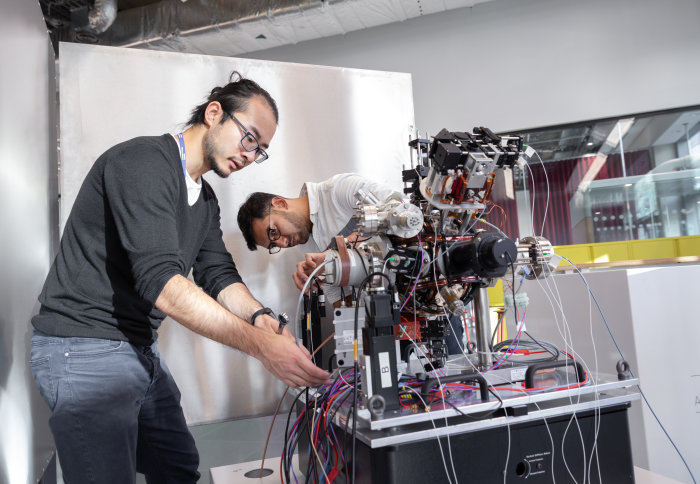Imperial in programme to push step change in UK quantum technology sector

Technologies that exploit the quantum properties of matter and their interactions may soon be used to create a new paradigm in information processing.
This could lead to faster and more accurate computation, and guarantee unbreakable encryption. Quantum technologies could also make it possible to navigate without satellites and uncover hidden features of the human body and physical environment.
The technologies, which have the potential to transform the way we work and live, are in some cases only a few years from market adoption – and Imperial is strongly supported by a government-backed push to grow and develop a UK quantum technology sector.
Professor Ian Walmsley FRS, Imperial’s Provost and Chair in Experimental Physics, was joined by academics and industry representatives at an October event, organised by the College's Industry Partnerships and Commercialisation team, which provided an opportunity for industry representatives to meet Imperial researchers and students and explore the developing quantum technology landscape.
Skills for the emerging quantum tech industry
Through a combination of government and industry funding, the UK has committed more than £1 billion over ten years to a co-ordinated programme in quantum technology, which has recently entered its second phase.
“The UK has a comprehensive and coherent programme of research and skills training, and Imperial is a major contributor to its success. We think there are significant commercial applications of quantum technologies and we are working closely with our industry partners to help realise these”, Professor Walmsley said.
Dr Ole Kock, Technical Authority in Quantum Sensors at specialised component manufacturer e2v Teledyne was also at the event. He said: “It is encouraging to see Imperial fostering collaboration between industry and academia. I believe that by promoting early and in-depth collaboration between academia and industry, this event showcased one of the main focuses of the national quantum programme. I was very pleased to see a great interest by the students in interacting with industry, including the industry use cases for their work that they shared with me in one-to-one conversations.”
Sensors
Quantum sensors could allow us to sense the physical world in powerful new ways. For example, atom interferometry, which recovers information from the wave behaviour of cold atoms, can be used to accurately measure minute differences in gravity, making it possible to detect underground objects invisible to traditional sensors – with transformative applications in fields like civil engineering. Atom-like structures within a nano-size synthetic diamond can also be used to sense magnetic and electric fields and small changes in temperature with extreme accuracy, a technology that could be used for sensing defects in the human body.
Computers
Quantum computers and simulators could in coming years be used to perform calculations at millions of times the speed of existing supercomputers, allowing leaps in a variety of fields that push the bounds of current computing power, for example customised medicine design, high-energy density batteries, composition of functional materials and accurate computation of chemical reactions. Imperial teams are working on quantum software development as well as photon-based hardware development.
Cryptography
The code breaking power of quantum computing could also pose a threat to traditional cryptography. However, quantum communications are expected to keep pace with this change by taking advantage of the uncertainty principle, which entails that you cannot measure a quantum communication without disturbing it, meaning one could detect if a hacker has eavesdropped when a key is transmitted. Imperial researchers are also pursuing lattice-based cryptography, which hides data in more computationally-demanding maths problems, making it potentially invulnerable even to quantum computers while allowing traditional communications infrastructure to be used.
Imperial supporting the UK quantum technology industry
Imperial hosts a Skills Hub and a Centre for Doctoral Training to train next-generation quantum engineers and scientists, including around 80 PhD students researching quantum technology and science. The Centre for Excellence in Quantum Engineering. Science and Technology, directed by Professor Myungshik Kim, promotes quantum technology research across engineering and science faculties while working closely with the National Quantum Technology Hubs in the universities of Birmingham, Glasgow and Oxford.
Professor Walmsley shared his views on global co-operation required to develop quantum technologies in a Financial Times piece in August.
This weekend he will be talking to global technology leaders about Europe’s prospects for quantum computing innovation at the DLD conference in Munich.
Article text (excluding photos or graphics) © Imperial College London.
Photos and graphics subject to third party copyright used with permission or © Imperial College London.
Reporter
David Silverman
Communications Division